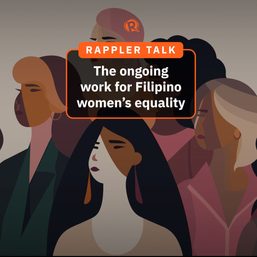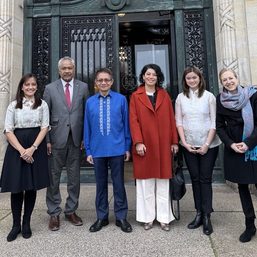SUMMARY
This is AI generated summarization, which may have errors. For context, always refer to the full article.
![[Just Saying] Senator Sotto’s excellent bid to empower women](https://www.rappler.com/tachyon/2021/06/birth-certificate-mother-surname-sq.jpg)
Senate Bill No. 2261, “An Act Amending Article 174 (1) of the Family Code and Article 364 of the Civil Code,” is one of the paradigm-changing legislative proposals that must immediately be passed and signed into law. It abandons a norm which has unduly fomented patriarchy without rhyme or reason. Senate President Vicente Sotto III must be commended for this proposal.
Under current law, legitimate children shall principally use the surname of the father. While Article 174 (1) of the Family Code allows legitimate children to use the surname of either their father and mother, Article 364 of the Civil Code provides that these children shall principally use the surname of the father.
A legitimate child’s use of their father’s surname is nonsensically based on the archaic belief that a man is the unquestioned head of the family. This is no longer necessarily true. Furthermore, such a belief ignores the vital role the mother plays in the life of the children. At the onset, the mother, not the father, takes care of the living human being in her womb. That is the greatest responsibility of all. She is first in physically connecting with and emotionally sheltering the life of another. Carrying a child to term even poses danger to a mother’s life.
It therefore makes sense that, to acknowledge this primary and intimate link between mother and child, the mother’s surname be the “default” option under the law. While parents can agree on what surname a child uses, if they cannot come to such an agreement, it is the mother’s which must be used. The Sotto bill explains the reason for this perfectly:
“The mother is the initial life-bearer of a child. The legitimate child’s developing physical and biological link was with the mother, as physiologically evidenced by the umbilical cord. Not only that, the nurturing and child rearing starts with the mother. Accordingly, if most of the biological, physiological, nurturing, and emotional content of the creation of the child is with the mother, in case of conflict between the latter and the father, the mother’s decision should have influence and weight.”
An Act Amending Article 174 (1) of the Family Code and Article 364 of the Civil Code by Rappler on Scribd
Some may feel disturbed by the timely proposal of Senate Bill No. 2261. This preference for the mother in certain matters involving children, however, is not alien to our law. It is in fact already found in jurisprudence and other provisions, the most prominent of which is the “tender-age presumption” under Article 213 of the Family Code, which generally gives custody of children below seven years of age to the mother in the event of separation.
That presumption “springs from the truth, well known to all men, that no other love is quite so tender, no other solicitude quite so deep, and no other devotion quite so enduring as that of a mother for the child. Generally, the love, solicitude, and devotion of a mother cannot be replaced by another and is worth more to a child of tender years than all other things combined” (Horst vs. Mclain 466 SW2d 187)
The use of the mother’s surname by legitimate children should not come off as strange or unusual. The provisions in our law allowing for the same have been around for decades. The right was also affirmed as recently as November 2020, in Alanis v. Court of Appeals. In that case, the Supreme Court emphasized that, via a court order, a legitimate child can change their surname to that of their mother. The Alanis decision is in line with the enlightened view that sees men and women as equal. This view is central to international treaties such as the Convention on the Elimination of All Forms of Discrimination Against Women, to which the Philippines is a signatory. It is also cemented in our own Constitution, which provides that “the State recognizes the role of women in nation-building, and shall ensure the fundamental equality before the law of women and men.”
Beyond decreeing the mother’s surname as the preferred option, Senate Bill No. 2261 proposes another important innovation: within 10 years from reaching the age of majority, a person can change their surname to either their father’s or their mother’s, simply by filing an application with the local civil registrar whose duty it is to act ministerially. No discretion is involved. There will be no more need to undergo a tedious and expensive court proceeding to exercise such right. The availability of this remedy further drives home the intent of the law to normalize and facilitate the use of the mother’s surname, should her child wish to do so. Additionally, after the 10-year grace period, the child can still go to court under the usual process to effect a change of name.
Recently, I was on air with Ted Failon and DJ Chacha on their radio show on 92.3 FM. We spoke about the issue of surnames and were surprised at how many listeners were tuning in to make comments and ask questions. It is quite amazing how many people could be so interested in the topic. It just shows that surnames are very important. I am sure people have a wide range of reasons for either being attached to the names they have, or wanting to change them. It is therefore very appropriate that Senate President Vicente Sotto III picked up on this matter and filed the necessary bill.
This bill is by no means the be all and end all of the struggle of women for better treatment under the law. Indeed, Philippine policy and legislation have a long way to go before we can truly say that we embody the high ideals the Constitution holds for women and their role in society. This bill is but one step among the many that need to be taken to reform the cultural, institutional, and socio-economic oppression women have been and are still subject to in the Philippines.
But, however small, it is a step in the right direction. Its potential impact, not only legally, but culturally and psychologically, would be a welcome disruption to the otherwise consistent patriarchy which occupies our public and private spaces.
To women, it is an opening for them to, quite literally, leave their mark, and have themselves acknowledged in a way conventionally accessible only to men.
To men, it is an opportunity to honor the women in our lives, and indeed, women in general. It is an opportunity to support spaces for women, and show that our own significance and dignity is not diminished by them having theirs.
To our legislators, this is your chance, if you are not already, to be part of this movement. All of you must not miss this opportunity to truly make a difference for the generations of Filipinos yet to come. Do not mistake Senate Bill 2261 as a trivial proposal. It is not. Its impact can and dare I say, will, be generational.
To Senate President Vicente Sotto III, many times good things come from unexpected places. I must confess that I did not expect this much needed proposal to come from you. You filed it and I believe that in itself is a statement of how you view women and your intention to support what is rightfully theirs. Kudos and job well done so far. There is much work ahead to convince others to support this measure, but it is work that can be done. Many of your colleagues in the Senate are already seasoned advocates for women’s rights, and I invite you to collaborate with them. It is my hope that this bill, and others like it, only push the movement for equality and reform faster and forward, with government leading the charge. – Rappler.com
Mel Sta Maria is dean of the Far Eastern University (FEU) Institute of Law. He teaches law at FEU and the Ateneo School of Law, hosts shows on both radio and Youtube, and has authored several books on law, politics, and current events.
Add a comment
How does this make you feel?







![[OPINION] ‘Some people need killing’](https://www.rappler.com/tachyon/2024/04/tl-some-people-need-killing-04172024.jpg?resize=257%2C257&crop_strategy=attention)
![[Judgment Call] Resisting mob mentality for warrantless arrests](https://www.rappler.com/tachyon/2024/04/judgement-call-mob-mentality.jpg?resize=257%2C257&crop=352px%2C0px%2C720px%2C720px)








There are no comments yet. Add your comment to start the conversation.